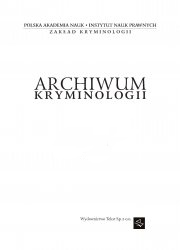Punishing white-collar offenders. Theory and function
Punishing white-collar offenders. Theory and function
Author(s): Andrzej UhlSubject(s): Law, Constitution, Jurisprudence, Criminal Law, Civil Law
Published by: Instytut Nauk Prawnych PAN
Keywords: white-collar crime;punishment theory;sentencing rationales;just deserts;
Summary/Abstract: The most prominent sentencing theories, also known as justifications for punishment, were developed long before white-collar crime entered mainstream criminology. Not surprisingly, the literature still focusses on the phenomenology of white-collar crime rather than on the issues of punishment. As a growing number of respectable offenders face criminal prosecution or even incarceration, the application of traditional sentencing rationales proves problematic in practical, ethical, and terminological terms. The article first explains how the debate on punishing upper-world offenders in Europe is inhibited by the offence-based nomenclature of economic crime or ‘collaring the crime, not the criminal’. Thereafter, a review and discussion of relevant English-language literature on the subject is offered, leaving open some questions as to its applicability to the Central-eastern European context. White-collar offenders were traditionally viewed as the perfect target for general deterrence, yet the body of evidence challenges this hypothesis. The theory of positive general prevention seems promising with regard to reinforcing business ethics and counteracting the spiral effect. It is hardly clear what the rehabilitation of middle-class convicts should mean in practice, while incapacitation is reinvented as business debarment and the loss of licences. There is often a glaring discrepancy between retributive and preventive ends in white-collar cases, which also features the political dimension of class inequalities in the criminal justice system. A short excursus provides insight into neoliberal criticisms of punishing white-collar offenders, revealing its unintentional similarities to penal abolitionism. Finally, empirical findings on subjects relevant to punishment theories, such as fair sentencing, public attitudes, and the effectiveness of deterrence, are reviewed with special attention given to Central and Eastern European research.
Journal: Archiwum Kryminologii
- Issue Year: 2/2020
- Issue No: XLII
- Page Range: 27-47
- Page Count: 21
- Language: English

